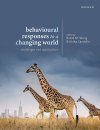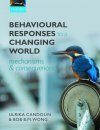![Behavioural Responses to a Changing World: Challenges and Applications Behavioural Responses to a Changing World: Challenges and Applications]()
Click to have a closer look
About this book
Contents
Customer reviews
Biography
Related titles
Recommended titles
About this book
For many animals, behavioural adjustments represent the first response to human-modified conditions. By improving reproduction and survival, such adjustments can play the lead in maintaining viable populations in the face of rapid environmental change. Behavioural responses, however, can also be maladaptive and reduce individual fitness, particularly if favourable 'reaction norms' have not yet evolved because animals are encountering conditions that they have never experienced before. Clearly, behaviour matters. But how can we capitalise on our understanding of animal behaviour to improve conservation and management outcomes?
Behavioural Responses to a Changing World: Challenges and Applications – a companion volume to the book from 2012 – examines wildlife behavioural responses to human-induced environmental change through a translational lens. Despite considerable and growing interest in research on the topic, the predictive value and practical application of what has been learned remains underappreciated and underutilized in the context of developing real-world solutions. To redress this, the current book builds upon the foundations of the original volume, but with a more applied perspective that focuses on highlighting how different forms of environmental challenges – from climate change to urbanisation – influence animal behaviour, and how we can effectively harness knowledge of animal behaviour to effect practical solutions to predicting and mitigating the weighty impacts of a radically changed and changing world.
Contents
1. Climate change
2. Noise pollution
3. Chemical pollution
4. Artificial light at night
5. Ocean acidification
6. Biological invasions
7. Wildlife harvesting
8. Habitat loss and fragmentation
9. Urbanisation
10. Multiple stressors
11. Conservation behaviour
12. Conservation breeding and translocation
13. Mitgating human-wildlife impacts
14. Plasticity and adaptation
15. Animal welfare
16. Pollinator management and food security
17. Parasites, pathogens, and disease
18. How humans and their societies respond when the world changes
19. Behavioural ecology for a changing world
Customer Reviews
Biography
Bob B. M. Wong is a Professor of Behavioural Ecology at Monash University, Australia. He is recognised as a world authority on wildlife behavioural responses to environmental change, and has contributed to international guidelines for applying animal behaviour research to management, policy and environmental risk assessment. Wong has served as Editor of Journal of Evolutionary Biology, Behavioral Ecology, Animal Behavior and Oikos. For more than 10 years, he has also held an elected position on the Executive Council of the International Society for Behavioral Ecology.
Ulrika Candolin is a Professor of Ecology and Evolutionary Biology at the University of Helsinki, Finland. Her research focuses on the responses of animals to human-induced environmental changes, and the consequences these responses have for populations and the structure and function of ecosystems. She has served as Editor of Behavioral Ecology, Evolution and Journal of Fish Biology, and as a panel member of numerous international funding agencies.




































